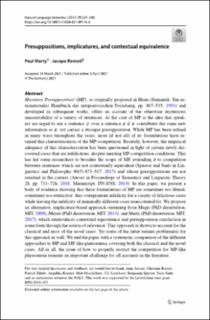| dc.description.abstract | Maximize Presupposition! (MP), as originally proposed in Heim (Semantik: Ein internationales Handbuch der zeitgenössischen Forschung, pp. 487–535, 1991) and developed in subsequent works, offers an account of the otherwise mysterious unassertability of a variety of sentences. At the core of MP is the idea that speakers are urged to use a sentence ψ over a sentence ϕ if ψ contributes the same new information as ϕ, yet carries a stronger presupposition. While MP has been refined in many ways throughout the years, most (if not all) of its formulations have retained this characterisation of the MP-competition. Recently, however, the empirical adequacy of this characterisation has been questioned in light of certain newly discovered cases that are infelicitous, despite meeting MP-competition conditions. This has led some researchers to broaden the scope of MP, extending it to competition between sentences which are not contextually equivalent (Spector and Sudo in Linguistics and Philosophy 40(5):473–517, 2017) and whose presuppositions are not satisfied in the context (Anvari in Proceedings of Semantics and Linguistic Theory 28, pp. 711–726, 2018; Manuscript, IJN-ENS, 2019). In this paper, we present a body of evidence showing that these formulations of MP are sometimes too liberal, sometimes too restrictive: they overgenerate infelicity for a variety of felicitous cases while leaving the infelicity of minimally different cases unaccounted for. We propose an alternative, implicature-based approach stemming from Magri (PhD dissertation, MIT, 2009), Meyer (PhD dissertation, MIT, 2013), and Marty (PhD dissertation, MIT, 2017), which reintroduces contextual equivalence and presupposition satisfaction in some form through the notion of relevance. This approach is shown to account for the classical and most of the novel cases. Yet some of the latter remain problematic for this approach as well. We end the paper with a systematic comparison of the different approaches to MP and MP-like phenomena, covering both the classical and the novel cases. All in all, the issue of how to properly restrict the competition for MP-like phenomena remains an important challenge for all accounts in the literature. | en_US |

